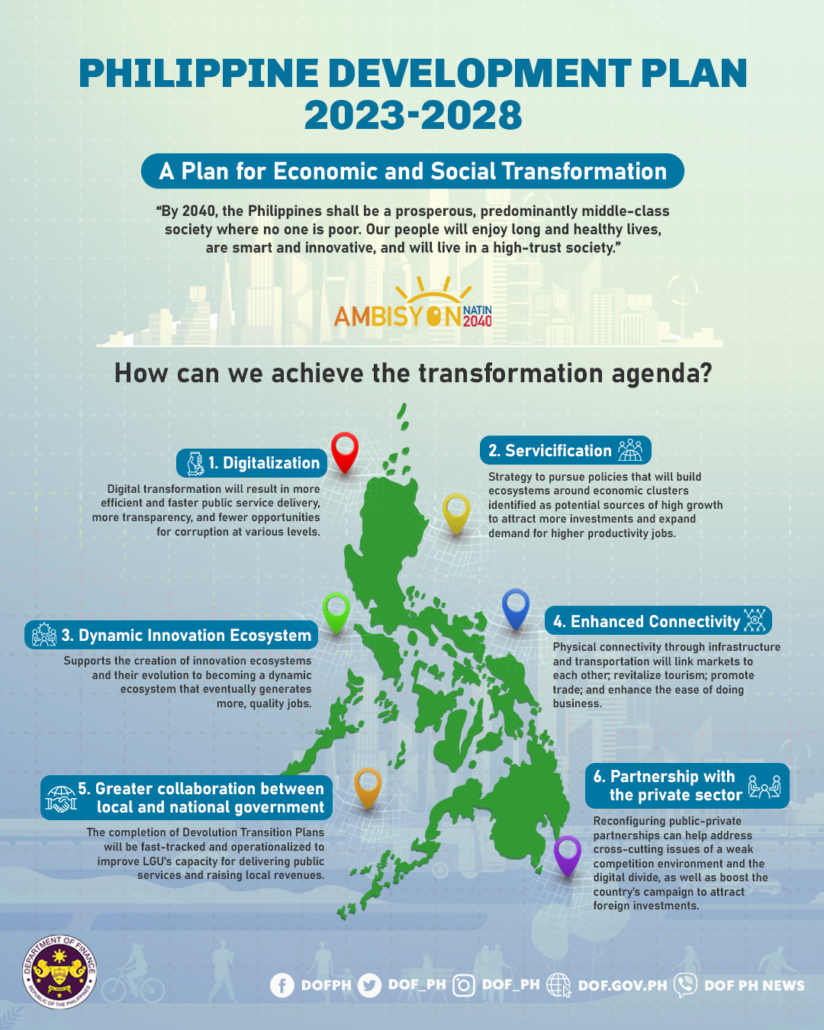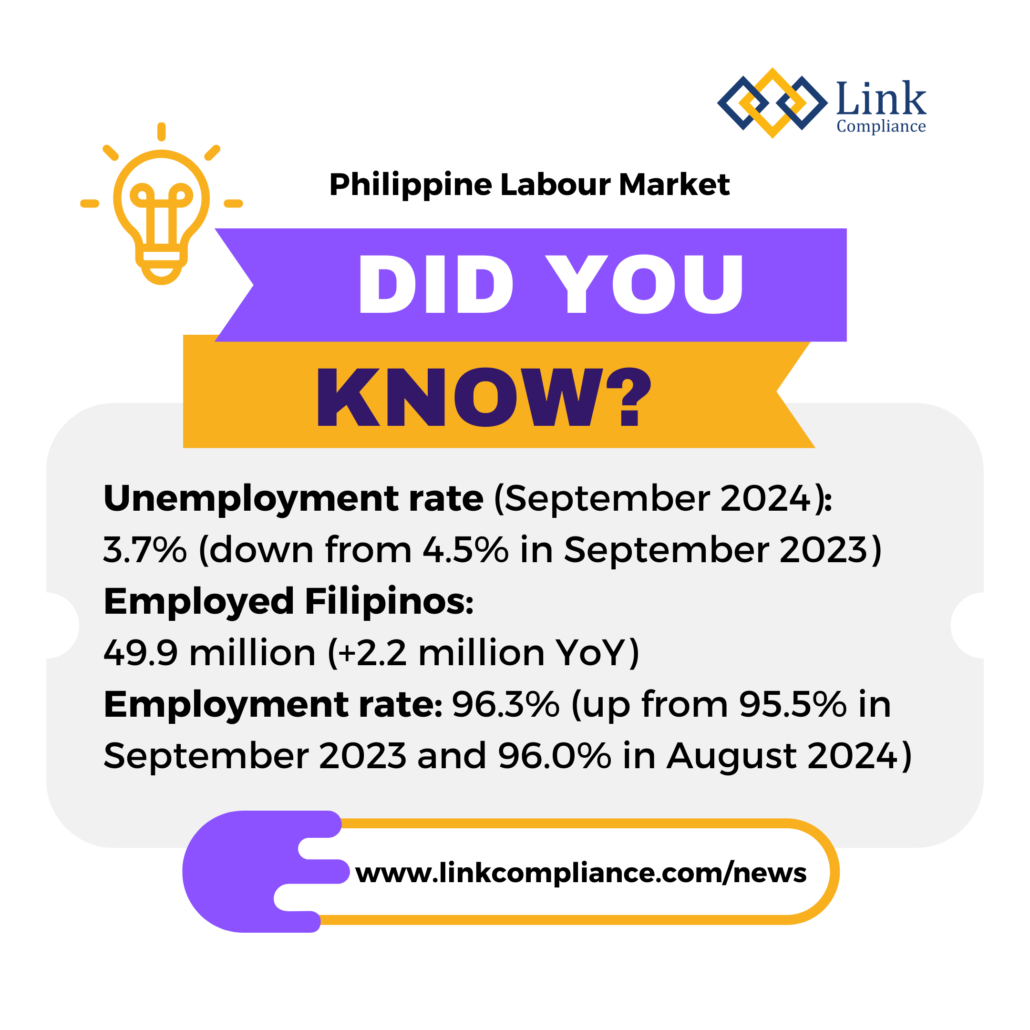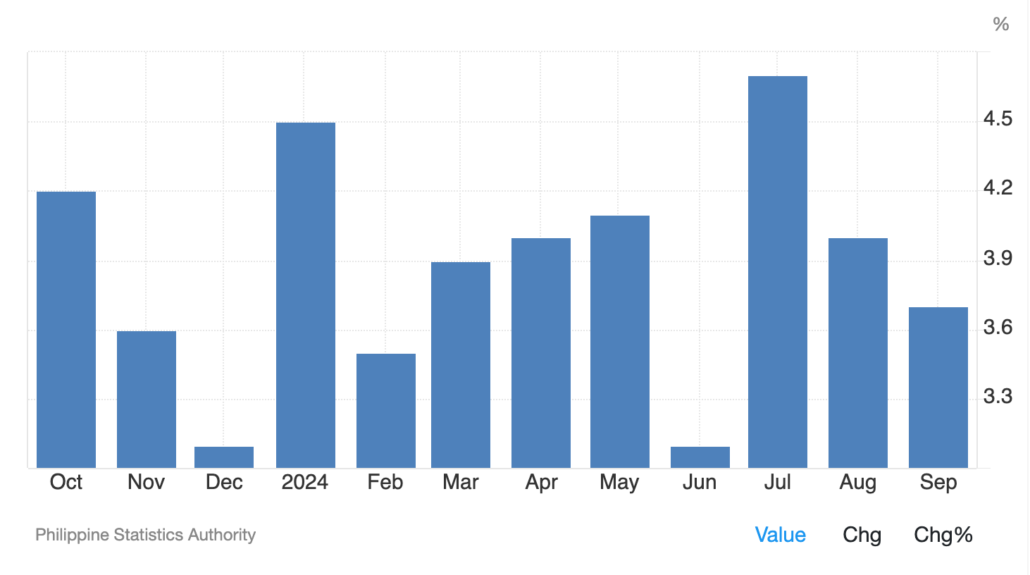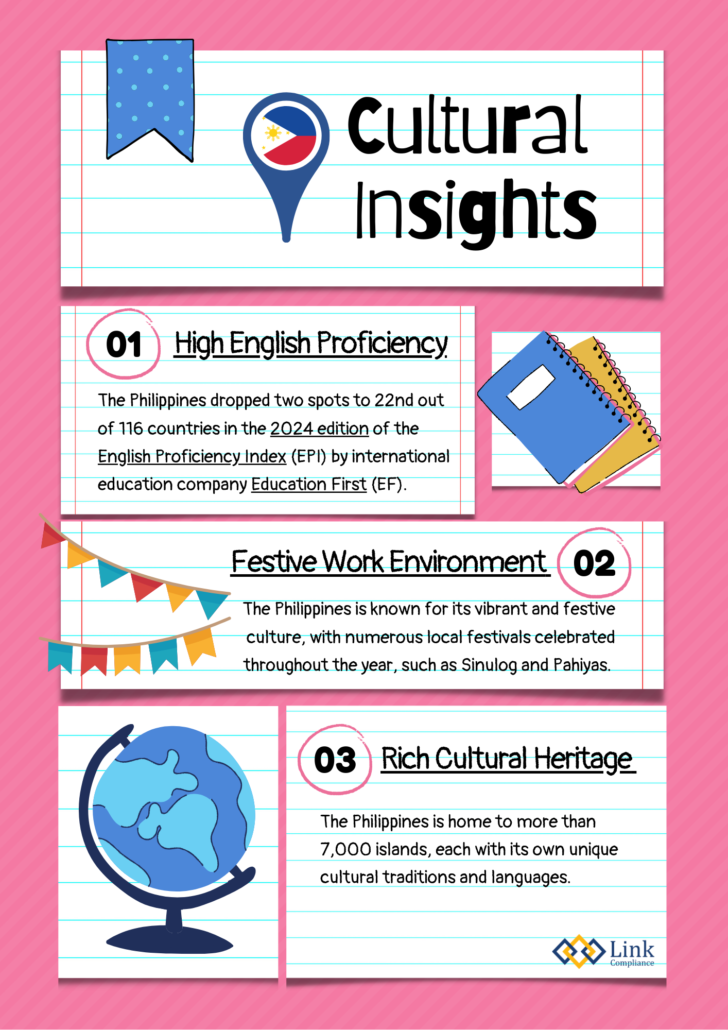In today’s fast-paced business world, securing the right talent is crucial for a company’s success, particularly in a dynamic economy like the Philippines. As one of Southeast Asia’s rising economic stars, the country has cultivated a strong and diverse workforce across key industries, supported by a rich talent pool and a competitive labour market. From the bustling metropolis of Manila to emerging cities across the archipelago, the Philippines offers a broad spectrum of skilled professionals driving its economic growth.
The Philippine government’s Development Plan 2023–2028 further strengthens this vibrant landscape by introducing transformative initiatives aimed at enhancing connectivity, fostering innovation, and building a more inclusive and resilient economy. These efforts, such as digitalising public services and supporting innovation ecosystems, create an environment where businesses can thrive and talent can flourish.
With diverse industries like BPO, IT, finance, manufacturing, and real estate attracting both multinational corporations and local businesses, the competition for top talent has intensified. Robust educational institutions continue to produce skilled graduates, but this dynamic environment compels employers to adopt strategic approaches to attract and retain the best candidates. In this blog, we will explore insights and strategies that align with the government’s transformative vision to help employers navigate the broader Philippine talent landscape and thrive in this competitive market.
The Philippine Development Plan 2023-2028
The Philippine Development Plan (PDP) 2023–2028 outlines the government’s vision for creating a prosperous, inclusive, and resilient society. Building on lessons from the pandemic, the PDP aims to transform the country’s economic and social sectors through targeted initiatives and collaborative efforts. Anchored on six key strategies—digitalisation, servicification, innovation ecosystems, enhanced connectivity, improved collaboration between local and national governments, and partnerships with the private sector—the plan seeks to address existing challenges and unlock new opportunities for sustainable growth. This framework provides a comprehensive roadmap to accelerate development and improve the quality of life for all Filipinos.
Image source: Facebook
Digitalisation
Digital transformation within the government aims to enhance service delivery, increase transparency, and reduce corruption. It will also enable the creation of better data systems, leading to more targeted social protection through the national ID (PhilSys) and improved job matching for seekers via PhilJobNet, the automated system developed by the Department of Labor and Employment (DOLE). Additionally, digital filing and payment systems could improve regulatory compliance.
Servicification
Servicification promotes intersectoral linkages to enhance value creation, expand markets, and improve delivery networks. While the Philippines has a strong competitive edge in services, contributing significantly to GDP and employment, these roles are often lower in productivity. Manufacturing, a key driver of job creation in other countries, remains underdeveloped. Targeted servicification in ICT, creatives, tourism, and logistics aims to attract investments, boost demand for higher-productivity jobs, and elevate these industries in the global value chain.
Dynamic Innovation Ecosystem
Innovation transforms knowledge and ideas into new products and improved processes, requiring a robust ecosystem that integrates research and development (R&D) institutions, product design, marketing, and entrepreneurship. The government will support the development and evolution of innovation ecosystems, aiming to create a dynamic environment that fosters job creation and ensures the generation of high-quality employment opportunities.
Enhanced Connectivity
As an archipelago, the Philippines faces unique connectivity challenges. While digital connectivity is vital, physical infrastructure and transport are equally crucial to link markets, connect urban and rural areas, and support the movement of people for work, business, and leisure. Developing local road networks, adopting active mobility options, and promoting e-vehicles can lower transport costs and enhance access to opportunities.
International connectivity is also a priority. Expanding airport capacity can boost tourism, while upgrading ports and improving maritime safety will facilitate trade and attract investments, further integrating the country into the global economy.
Greater Collaboration Between Local and National Governments
The PDP emphasises local governments as equal partners in national development, recognising their role as frontline service providers crucial to regional progress. A key governance milestone is the 2018 Mandanas-Garcia ruling, which increased local governments’ revenue allotments by approximately 23%, enabling greater decentralisation of programmes and functions as national agencies faced reduced budgets.
Partnership with the Private Sector
The government seeks to expand the private sector’s role in delivering public benefits by providing targeted incentives and creating a favourable business environment for job-generating industries. Public-private partnerships (PPPs) are essential for addressing challenges such as weak competition, the digital divide, and attracting foreign investments. Given the limited fiscal space in the coming years, PPPs are a key strategy for enhancing infrastructure. Increased private sector involvement in sectors like housing, transport, and digital infrastructure will free up public funds, enabling investment in human capital to address pandemic-related setbacks in healthcare and education.
Download the full PDP: HERE
The Philippine Development Plan (PDP) 2023–2028 provides a comprehensive roadmap for the country’s growth, with significant implications for employers looking to tap into the available talent pool in the Philippines.
These efforts to digitalize public services, foster innovation, and enhance connectivity are not only transforming the Philippine economy but also creating new talent demands in emerging sectors such as ICT, digital services, and tech-based roles. As the economy evolves, the need for highly skilled professionals becomes even more pressing, underscoring the importance of effective recruitment strategies and compliant, flexible workforce solutions.
“By 2040, the Philippines shall be a prosperous, predominantly middle-class society where no one is poor. Our people will enjoy long and healthy lives, are smart and innovative, and will live in a high-trust society.” AmBisyon Natin 2040
Source: https://pdp.neda.gov.ph/wp-content/uploads/2023/09/Philippine-Development-Plan-2023-2028.pdf
Philippine Labour Market: Gradual Progress with Challenges Ahead
While the Philippine labour market has made impressive strides, with the unemployment rate reaching its lowest level since 1999 and over 90% of the working-age population employed, the journey is far from complete. These positive developments reflect the broader economic objectives set out in the Philippine Development Plan (PDP) 2023-2028, which emphasises inclusive growth, digitalisation, and improved job quality. However, challenges persist, particularly in relation to the quality of employment, skill mismatches, and wage stagnation.
The rapid pace of digitalisation is reshaping the job landscape, increasing the demand for tech-based skills, yet many displaced workers struggle to meet these evolving requirements. This growing disparity between available skills and market needs highlights the urgent need for targeted interventions, in line with the PDP’s focus on fostering innovation and developing a competitive workforce, to ensure the labour force remains adaptable, skilled, and equipped to thrive in the modern economy.
Chart: Philippines Unemployment Rate
Chart source: https://tradingeconomics.com/philippines/unemployment-rate
While the Philippine labour market has made significant progress, it still faces challenges such as skill mismatches, wage stagnation, and regional disparities in employment opportunities. As businesses navigate this evolving landscape, it becomes crucial to adapt recruitment strategies to attract talent that meets the demands of a rapidly changing economy. In this context, recruitment services and Employer of Record (EOR) solutions play a vital role in addressing these challenges, helping businesses access the right talent, maintain compliance with local regulations, and streamline their workforce management processes.
The Role of Recruitment and Employer of Record (EOR) Services in Employment Growth
As the Philippine economy continues to digitalise, the challenges of skill development and job quality must be addressed to ensure the progress in employment isn’t overshadowed. Recruitment services and Employer of Record (EOR) solutions are critical in this context. With their in-depth knowledge of the local labour market, recruitment firms help businesses source talent with the skills required to meet the demands of a digital economy. EOR services, on the other hand, offer businesses the flexibility to hire, onboard, and manage employees compliantly, particularly in a rapidly changing regulatory and economic landscape.
As the labour market evolves, businesses are increasingly relying on recruitment and EOR services to overcome challenges such as skill gaps, compliance complexities, and regional workforce distribution.
- Recruitment Services: Bridging the Skills Gap
The Philippine labour market faces skill gaps in emerging sectors like ICT and digitalization. Recruitment services help businesses bridge this gap by leveraging their local expertise and connections to identify candidates with in-demand skills. These services also ensure that businesses find candidates who align with company culture, particularly in a market where soft skills and cultural fit are highly valued.
- EOR Services: Simplifying Compliance and Operations
The Philippines has a complex labour framework, including laws on regularization, 13th-month pay, and stringent employee benefits requirements. EOR providers navigate these complexities on behalf of businesses, ensuring compliance with the Labour Code and other local regulations. This is especially beneficial for foreign companies, allowing them to hire top Filipino talent without the time-consuming process of setting up a legal entity. EOR services manage everything from payroll to tax reporting, reducing administrative burdens for employers.
- Promoting Regional Growth and Inclusivity
Much of the Philippine job market is concentrated in Metro Manila, but recruitment and EOR services can help redistribute opportunities to underserved regions, such as Cebu and Davao. By targeting regional talent, these services promote inclusivity, reduce urban migration, and support balanced economic development, aligning with government efforts to stimulate growth outside major cities.
- Supporting SMEs with Scalable Workforce Solutions
SMEs form the backbone of the Philippine economy but often lack the resources to manage robust HR processes. Recruitment and EOR services provide cost-effective solutions to source, onboard, and manage employees while maintaining compliance. This flexibility allows SMEs to focus on growing their business without the burden of extensive HR infrastructure.
- Supporting Digital Transformation
With the Philippine government pushing for digital transformation, there is an urgent need for tech-skilled professionals. Recruitment services help businesses identify and hire talent with specialized skills in areas like data analytics, software development, and cybersecurity. EOR services also enable companies to hire remote workers, providing a flexible workforce that can meet digital demands.
Link Compliance plays a critical role in helping businesses thrive in the evolving Philippine labour market. Through our recruitment and Employer of Record (EOR) services, we simplify the hiring process, ensure compliance, and provide scalable workforce solutions.
Cultural Insights: Fun Facts to Know Before Hiring in the Philippines
Before coming to the end of this blog, let’s explore some fun cultural insights that will enhance your hiring experience in the Philippines.
- High English Proficiency
The Philippines dropped two spots to 22nd out of 116 countries in the 2024 edition of the English Proficiency Index (EPI) by international education company Education First (EF). The Philippines is considered to have a “high” proficiency level, which means that people can understand TV shows, read newspapers, and give presentations at work. Source: BusinessWorld Publishing
- Rich Cultural Heritage
The Philippines is home to more than 7,000 islands, each with its own unique cultural traditions and languages. This rich cultural diversity is reflected in the vibrant festivals, cuisine, and local customs, offering a dynamic and enriching environment for both employers and employees.
- Festive Work Environment
The Philippines is known for its vibrant and festive culture, with numerous local festivals celebrated throughout the year, such as Sinulog and Pahiyas. Incorporating a festive and inclusive atmosphere in the workplace can be a great way to connect with Filipino employees and align with their cultural values.
–
Contact us today!
Email: info@linkcompliance.com
More information: www.linkcompliance.com
–
Singapore | Malaysia | Indonesia | USA | China (Shanghai, Beijing, Shenzhen, Hong Kong, Taiwan) | Vietnam | Japan | Germany | Turkey | Philippines







